Readings Newsletter
Become a Readings Member to make your shopping experience even easier.
Sign in or sign up for free!
You’re not far away from qualifying for FREE standard shipping within Australia
You’ve qualified for FREE standard shipping within Australia
The cart is loading…






This title is printed to order. This book may have been self-published. If so, we cannot guarantee the quality of the content. In the main most books will have gone through the editing process however some may not. We therefore suggest that you be aware of this before ordering this book. If in doubt check either the author or publisher’s details as we are unable to accept any returns unless they are faulty. Please contact us if you have any questions.
International NGOs are increasingly under pressure from governments and the public to demonstrate evidence of impact and positive results. This book critically examines how development NGOs working around the world create knowledge and evidence, and use it to satisfy donors, to improve their practices, and to further our understanding of poverty. It asks questions such as: does the evidence of community organizations count as much as higher-level organizations? Should southern NGOs be expected to disseminate pre-formed development ‘messages’? What do we mean by ‘evidence-based advocacy’? The eight studies that form the core of Negotiating Knowledge span scholarly and practitioner research across Africa, Asia and Latin America. They tackle political issues that determine what forms of evidence and knowledge are given credence. They explore the power dynamics that shape the value placed on knowledge and learning in relationships within and between organizations. Negotiating Knowledge urges NGOs to examine how they use knowledge in order to make it work better for themselves and for the people that they aim to assist. To do this well, they have to understand better what they mean by knowledge and evidence, revisit the value that they place on learning and knowledge, and invest in appropriate capacity and skills. This book is essential reading for international NGO staff, policy makers, as well as those researching, studying and making policy in international development.
$9.00 standard shipping within Australia
FREE standard shipping within Australia for orders over $100.00
Express & International shipping calculated at checkout
This title is printed to order. This book may have been self-published. If so, we cannot guarantee the quality of the content. In the main most books will have gone through the editing process however some may not. We therefore suggest that you be aware of this before ordering this book. If in doubt check either the author or publisher’s details as we are unable to accept any returns unless they are faulty. Please contact us if you have any questions.
International NGOs are increasingly under pressure from governments and the public to demonstrate evidence of impact and positive results. This book critically examines how development NGOs working around the world create knowledge and evidence, and use it to satisfy donors, to improve their practices, and to further our understanding of poverty. It asks questions such as: does the evidence of community organizations count as much as higher-level organizations? Should southern NGOs be expected to disseminate pre-formed development ‘messages’? What do we mean by ‘evidence-based advocacy’? The eight studies that form the core of Negotiating Knowledge span scholarly and practitioner research across Africa, Asia and Latin America. They tackle political issues that determine what forms of evidence and knowledge are given credence. They explore the power dynamics that shape the value placed on knowledge and learning in relationships within and between organizations. Negotiating Knowledge urges NGOs to examine how they use knowledge in order to make it work better for themselves and for the people that they aim to assist. To do this well, they have to understand better what they mean by knowledge and evidence, revisit the value that they place on learning and knowledge, and invest in appropriate capacity and skills. This book is essential reading for international NGO staff, policy makers, as well as those researching, studying and making policy in international development.